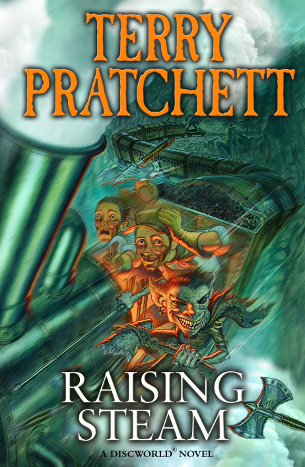Why you can trust 12DOVE
While we’ve got used to the Discworld statistics stacking up over the years, the arrival of the fortieth novel in the sequence still seems like an appropriate moment to pause to take (rolling) stock. Especially as it’s also 30 years since the inept wizard Rincewind first fled screaming from danger in The Colour Of Magic .
Throughout, the quality of the novels has never wavered. Plenty else has, though. Whereas the first few books were essentially powered by the lampooning of fantasy tropes, which produced a new kind of magic unique to Pratchett’s work, the Discworld has changed. A medieval world has morphed into what’s essentially a 19th century society, albeit one where humans co-exist with such people – and they’re presented as fully rounded people, it’s important to note – as trolls, dwarves, golems and now even geeky goblins.
Raising Steam marks a completion, of sorts, of this process, because such a world can’t rely on the magic of the Middle Ages for its forward momentum. No, it needs a new power source: coal-fired steam. Step forward Dick Simnel. It would be easy to mistake Simnel for a straightforward, even simple lad, but that’s to overlook the fact that he’s an engineer. And not just a glorified blacksmith, but someone who’s learnt the mysteries of the sliding rule, an innovator, a lad with a shed who knows how to use it.
Through careful experimentation and occasionally blowing stuff up on a more-or-less controlled basis, Simnel has tamed the steam. Having done so, he’s made his way to Ankh-Morpork, and meetings with Harry King, Piss Harry (a man who accumulated his fortune dealing with the city’s waste products) and Moist von Lipwig, con artist turned senior city servant at the bank and post office, and just the man to sell a new idea to the masses. When the duo see Simnel’s locomotive, Iron Girder, they also see the future. What follows is Pratchett’s take on the railway fever that gripped Victorian Britain at the excitable zenith of industrialisation. Despite the misgivings of the city’s tyrant, Vetinari, tracks will be laid.
Which isn’t to say that’s wholly what the book is about at its core. Sure, Pratchett has plenty of fun with vignettes drawing on railway history – Moist’s encounter with nascent travel writer Georgina Bradshaw, for example – but this can also be read as a novel about what progress, for want of a better word, should mean for the wider population.
To unpack that idea a little, a recurring theme in Pratchett’s work is that he’s all for live-and-let-live freedom. But how do you practically go about ensuring people have the opportunity (Pratchett is an old-fashioned moralist in that he likes his characters to earn whatever rewards they get) for such freedom? The railway, which brings people together, opens up possibilities and certainly helps, but it’s also a potent symbol of change for those who don’t want change thank you very much. And at the extreme end of those who don’t want change lie the fundamentalists, the violent naysayers, the people who prefer to blow stuff up on a more-or-less uncontrolled basis.
How to counter such a mindset is the overarching preoccupation of the second half of the novel, as Vetinari orders that Moist, Harry and Simnel build a railway all the way to Uberworld. Why? Without giving too much away, it’s because certain dwarves can’t accept being at peace with traditional enemies. (Note to fans: Koom Valley, Vimes the Blackboard Monitor and all that are revisited.)
If that makes Raising Steam sound rather worthy, relax, it’s laugh-out-loud funny too. Who else but Pratchett, for instance, would dare to offer us a Frenchified noble called the Marquis des Aix en Pains? Or bury a sly Thomas the Tank Engine gag in a footnote? A chuffing wonderful book.
Jonathan Wright twitter.com/Jonathanw101
Read more of our book reviews .
SFX Magazine is the world's number one sci-fi, fantasy, and horror magazine published by Future PLC. Established in 1995, SFX Magazine prides itself on writing for its fans, welcoming geeks, collectors, and aficionados into its readership for over 25 years. Covering films, TV shows, books, comics, games, merch, and more, SFX Magazine is published every month. If you love it, chances are we do too and you'll find it in SFX.














